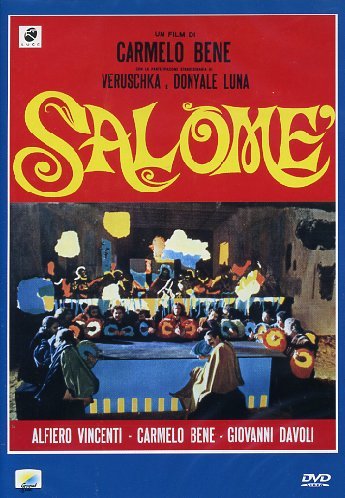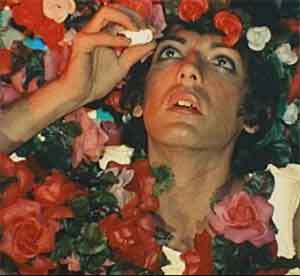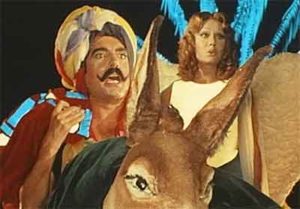 This 1972 Italian obscurity is easily the wildest production of Oscar Wilde’s SALOME you’ll ever see. For that matter, it’s one the most outrageous films ever made. Overflowing with eye-burning colors, bellowed dialogue, hyper-kinetic editing and camerawork, costumes and props made of neon, and even vampires, director Carmelo Bene‘s film is an unrelenting sensory assault that still manages to find time for quiet, lyrical moments.
This 1972 Italian obscurity is easily the wildest production of Oscar Wilde’s SALOME you’ll ever see. For that matter, it’s one the most outrageous films ever made. Overflowing with eye-burning colors, bellowed dialogue, hyper-kinetic editing and camerawork, costumes and props made of neon, and even vampires, director Carmelo Bene‘s film is an unrelenting sensory assault that still manages to find time for quiet, lyrical moments.
Even though the technical effects aren’t up to mega-budget Hollywood standards, they are effective within SALOME’S lunatic universe. It was produced as well as written and directed by the infamous Italian stage impresario Carmelo Bene, based on his stage piece of the same name. It was the fourth of Bene’s five films, and in my view the most interesting by far.
The art direction suggests a head-on collision between Hieronymus Bosch and Andy Warhol, and featuring dozens of naked extras cavorting among deliberately artificial, multi-colored neon props; the photography was by Bene’s stock cinematographer Mario Masini, whose work was never more evocative. The acting—of Bene’s “longtime companion” Lydia Mancinelli, FELLINI SATYRICON’S Donyale Luna (as the screen’s only dark-skinned Salome), the German supermodel Veruschka, and Bene himself as King Herod—might charitably be called over-the-top, as the performers babble nearly all their dialogue at the top of their lungs (a Bene trademark). The camerawork is as spastic as anything since the advent of MTV and the editing appears to have been employed with a chainsaw (very few shots are held for more than five seconds). The result is an often annoying, incoherent yet profoundly intense viewing experience.
The art direction suggests a head-on collision between Heironymous Bosch and Andy Warhol…
 If you’re at all familiar with Wilde’s play, or the biblical passages upon which it’s based, then you know the story. Salome, the whorish daughter of queen Herodias, is lusted after by her depraved stepfather Herod. When her attempted seduction of the visiting prophet Iokanaan fails, Salome agrees to satisfy her stepfather’s perverted whims through the infamous dance of the seven veils. She then demands that Herod do her bidding and murder Iokanaan.
If you’re at all familiar with Wilde’s play, or the biblical passages upon which it’s based, then you know the story. Salome, the whorish daughter of queen Herodias, is lusted after by her depraved stepfather Herod. When her attempted seduction of the visiting prophet Iokanaan fails, Salome agrees to satisfy her stepfather’s perverted whims through the infamous dance of the seven veils. She then demands that Herod do her bidding and murder Iokanaan.
Needless to say, Carmelo Bene offers quite a few unique twists. For starters, Salome’s first dialogue with Iokanaan is shouted back and forth with the latter stationed on a boat in the middle of a river and Salome back on shore; each time he rejects her advances, he’s hit over the head with a thick book. Even more bizarre is Salome’s final confrontation with Herod; as he quickly descends into utter madness she peels the skin from his face.

And that’s not even taking into account the numerous flashes of vampire fangs worn by many of the actors, complete with the inevitable though brief neck-biting. For all of Oscar Wilde’s well-known preferences for unbridled decadence, I strongly doubt he ever dreamed of anything like this.
For all of Oscar Wilde’s well-known preferences for unbridled decadence, I strongly doubt he ever dreamed of anything like this.
Like his films, director Carmelo Bene is unknown in this country. While I wouldn’t call Bene’s work great, it demonstrates s a sensibility every bit as ingeniously warped as those of cinematic wackos like Ken Russell and Alejandro Jodorowsky. There are some truly extraordinary moments here, such as the soundless opening montage of bizarre and decadent imagery, an excellent introduction to the film we’re about to view; a man crucifying himself on a flashing neon cross; Herod/Bene’s final speech, delivered in an endless babble as the camera madly zooms in and out; and of course Salome’s scandalous dance of the seven veils, surprisingly the most haunting, lyrical sequence in the movie.
But Bene’s most intelligent decision was keeping SALOME’S running time—barely 80 minutes—mercifully brief. Although he shows little restraint in the film’s imagery, Bene does appear to know when enough is enough.
Vital Statistics
SALOME
Cinecitta Productions
Director: Carmelo Bene
Producer: Paulo Mercuri
Screenwriter: Carmelo Bene
(Based on the play by Oscar Wilde)
Cinematography: Mario Masini
Editor: Mauro Contini
Cast: Donyale Luna, Lydia Mancinelli, Alfiero Vincenti, Carmelo Bene, Piero Vida, Franco Leo, Roberto Ignozzi, Marco Carelli, Dakar, Juan Fernandez, Veruschka
